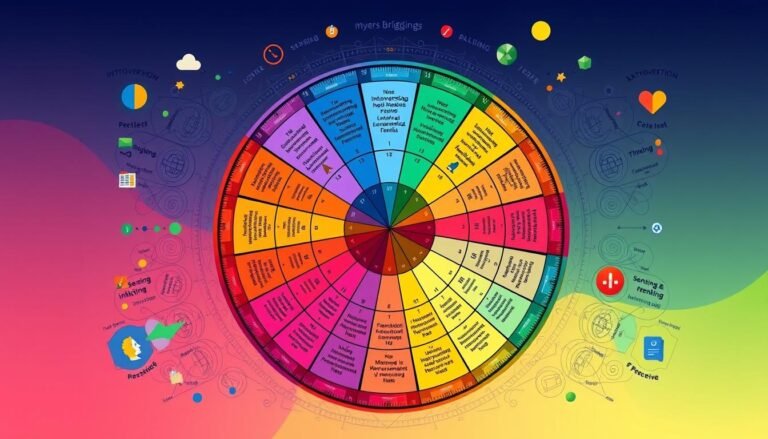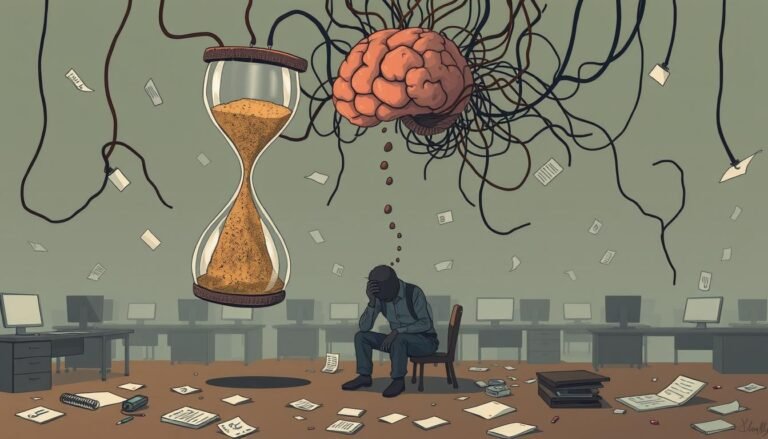Personality and Body Image: Exploring the Connection
Imagine scrolling through social media and seeing perfect bodies everywhere. You feel both admiration and inadequacy. This is common in today’s world, where beauty standards are hard to reach.
A study with 1,747 adults from the University of Thessaly in Greece shows how personality affects our body image. It found interesting insights into how we see ourselves and how our personality influences these views.
The study used tools to measure body image, self-esteem, and personality. It showed that our reasons for exercising, where we work out, and our personality type impact how we see our bodies. This research is key to understanding the mental health effects of body dissatisfaction and promoting body positivity.
We will explore how society, media, and our personalities shape our body image. We will also discuss ways to have a healthier relationship with our bodies, no matter what beauty standards change.
Key Takeaways
- Personality traits significantly influence body image perceptions
- Social media exposure can negatively impact body satisfaction
- Exercise habits and motivations affect body image
- Gender differences exist in body image concerns
- Self-esteem plays a crucial role in body satisfaction
- Understanding personality traits can help improve body image
- Promoting body positivity is essential for mental health
Understanding Body Image in Modern Society
Body image is key in our lives, shaping how we see ourselves and the world. It’s complex, influenced by media and cultural ideals.
Definition and Importance of Body Image
Body image is how we see our physical look. It’s more than just what we see in the mirror. It’s how we feel about our bodies too. Some people see themselves as overweight, even when they’re not, showing a gap between what we think and reality.
Societal Influences on Body Perception
Society pushes us to fit certain physical standards. This can make us feel insecure, even if we have a positive body image. Media and cultural ideals play big roles, setting unrealistic beauty standards. Different cultures value different body types.
Gender Differences in Body Image Concerns
Women often feel more body dissatisfaction than men. This is seen in higher rates of eating disorders among women. Traits like neuroticism and extraversion are linked to these issues in women. Focusing on body function, not appearance, can help both genders accept their bodies better.
“The body is not an apology. It is a celebration of human resilience and diversity.”
It’s vital to understand these factors to promote body acceptance. This helps fight negative self-perceptions in our society today.
The Five-Factor Model of Personality
The Five-Factor Model, also known as the Big Five, is key to understanding individual differences. It breaks down personality into five main areas: extraversion, neuroticism, openness to experience, agreeableness, and conscientiousness.
This model was developed in the 1980s and 90s. It’s based on the lexical hypothesis, which says human personality traits are found in language. Researchers found these five factors in many languages, showing they are universal.
Studies show genetics play a big role in these traits. Kids use these traits to describe themselves and others. And these traits stay the same as we grow older. Despite some criticism, the Five-Factor Model is still widely used in many fields.
Research links these traits to how we see our bodies and eat. A study of 1533 Polish women aged 18-36 found neuroticism linked to anorexia readiness. Women with high neuroticism and low extraversion tend to have bad body image and eating habits.
“Personality factors such as high Emotionality and low Extraversion can lead to worse body image and well-being.”
The Five-Factor Model has made personality psychology exciting again. It helps us understand how individual differences affect our lives, including how we see our bodies and our overall happiness.
Personality and Body Image: Exploring the Connection
Our personality greatly affects how we see ourselves and our bodies. Research has found interesting links between certain traits and body perception.
Neuroticism and Body Dissatisfaction
Studies show a strong link between neuroticism and negative body image. Those with high neuroticism often feel unhappy with their bodies. This is because neuroticism is linked to self-criticism and emotional ups and downs, affecting how we see ourselves.
Extraversion and Body Image
Extraversion is often linked to a positive body image. People who are outgoing tend to have higher self-esteem and see their bodies more positively. Research shows that models with pear-shaped bodies for women and broad shoulders for men are often seen as more extraverted.
Conscientiousness and Self-Perception
Conscientiousness is linked to a better body image. This trait includes self-discipline and attention to detail, helping in a balanced self-view. Yet, a study found that conscientious people might feel more body shape dissatisfaction. This could be because they have higher personal standards.
Understanding these connections helps us see why body image concerns vary. These differences are seen across cultures, ages, and personal experiences. Knowing how personality affects our self-view can help us better understand body image issues and find ways to improve.
The Role of Self-Esteem in Body Image
Self-esteem is key in how we see our bodies and feel about ourselves. A study with 298 students aged 18-21 showed how personality traits affect our self-worth and body confidence.
The study found that being conscientious, emotionally stable, and outgoing boosts self-esteem. These traits help shape our body image, showing self-esteem’s important role.
Interestingly, how personality traits affect body esteem differs by ethnic group:
- Asian Americans: Self-esteem links conscientiousness and emotional stability to body esteem.
- Hispanic Americans: Self-esteem connects conscientiousness and extraversion to body esteem.
- Caucasian Americans: Self-esteem ties emotional stability and extraversion to body esteem.
Self-esteem is a strong predictor of body esteem in both men and women. In the U.S., the average link between body satisfaction and self-esteem is 0.65.
Having an unhealthy body image can lead to neglecting oneself, affecting many life areas.
To build positive self-esteem and body image, we need a supportive environment. Surround yourself with loving friends and family. Enjoy exercise for its joy, not just for looks. And love your natural body shape and size.
| Factors Influencing Self-Esteem | Impact on Body Image |
|---|---|
| Supportive social circle | Boosts self-worth and body confidence |
| Regular, enjoyable exercise | Improves body image and overall well-being |
| Self-acceptance | Reduces body dissatisfaction |
| Positive self-talk | Enhances psychological well-being |
By focusing on these areas, we can build a healthier body image. This improves our self-esteem, leading to better mental health and body confidence.
Gender Differences in Body Dissatisfaction
Body image concerns differ a lot between men and women. This shows how society and gender roles play a big part. Studies show big differences in how men and women see their bodies and what they think is the perfect body.
Female Body Image Concerns
Women often feel a lot of pressure to look a certain way. A study with 238 female college students found they were more unhappy with their bodies than men. They usually pick an ideal body that’s smaller than they think they are. This shows how society’s expectations affect how women see themselves.
Male Body Image Issues
Men’s body image worries are different from women’s. A study with 85 male college students found they often want to be as big or bigger than they are. This shows the influence of the muscular ideal in many cultures. Also, men usually think they look better and are smarter than women do.
Cultural Variations in Body Ideals
Body ideals change from culture to culture, but Western ideas are spreading everywhere. In Western societies, thinness for women and muscle for men are big. But in Asian countries, body dissatisfaction is growing. This shows how culture and personal views of body image mix together.
| Gender | Body Dissatisfaction | Appearance Importance | Body Appreciation |
|---|---|---|---|
| Women | Higher | Higher | Lower |
| Men | Lower | Lower | Higher |
These differences in body dissatisfaction show we need different ways to help people feel good about their bodies. This should be done for different groups and cultures.
Personality Traits and Disordered Eating
Personality traits are key in the start and upkeep of eating disorders. Research links certain psychological factors to eating issues. High neuroticism and low extraversion often tie to eating disorders, especially in women.
A 2024 study found neuroticism links to generalized anxiety and dieting. This shows a strong tie between personality and eating habits. The link between personality and eating issues might vary for men and women.
Perfectionism is also tied to eating disorders. Those who aim for perfection are more likely to feel body dissatisfaction. They might seek an unattainable ‘perfect’ body or fear weight gain.
| Personality Trait | Association with Eating Disorders |
|---|---|
| High Neuroticism | Increased risk |
| Low Extraversion | Increased risk |
| Low Openness | Associated with some disorders |
| Low Agreeableness | Associated with some disorders |
| Perfectionism | High risk for body dissatisfaction |
Early treatment is crucial for eating disorders. Getting professional help is important when food, exercise, or body image issues arise. Clinicians should tackle personality issues along with treating the eating disorder for full care.
Media Influence on Body Image and Personality
The digital world we live in deeply affects how we view ourselves. Social media plays a big role in shaping our self-image and body perception. Let’s look at how online presence impacts our personal views and mental health.
Social media’s impact on self-perception
Social media is a big part of our daily lives, especially for the young. A study shows that youth spend six to eight hours a day on screens, mostly on social media. This constant use can have both good and bad effects.
Cyberbullying is a big problem, with 59% of U.S. teens experiencing it. This online bullying can really hurt our self-esteem and how we see our bodies. But, body-positive content on social media can help improve how we feel about our bodies.
Representation and body positivity online
The growth of diverse and body-positive movements on social media is changing things. A study with 233 female participants found that body-positive social media can make us feel better about our bodies. This effect gets even stronger when captions support body-positive ideas.
| Social Media Use | Impact on Body Image |
|---|---|
| Reduced by 50% | Significant improvement in weight and appearance perception |
| Limited to 60 minutes daily | Improved overall appearance self-regard |
| Average 188 minutes daily | No significant changes in body image |
These results show that using social media wisely and seeing positive online content can help us feel better about ourselves. It’s all about being mindful in our digital world.
The Interplay Between BMI, Personality, and Body Image
The link between Body Mass Index (BMI), personality, and body image is intricate. In Malaysia, a significant 30% of adults are overweight, with another 17.7% obese. This high rate of excess weight affects both physical health and how people see their weight.
Studies indicate that BMI greatly affects how satisfied people are with their bodies. In Malaysia, many adults see themselves as healthy even if they are overweight or obese. This mismatch between how they see themselves and their actual weight can lead to serious health problems. High BMI is a big reason for disability and death in Malaysia.
Personality traits also shape how people view their bodies. Those with low self-esteem are more likely to feel unhappy with their bodies and be critical of their looks. This is especially true for women, where BMI and negative body image are more closely linked than in men.
| BMI Category | Body Dissatisfaction (Cohen’s d) |
|---|---|
| Obesity vs Normal Weight (Questionnaires) | 0.89 |
| Obesity vs Normal Weight (Silhouette Scales) | 1.41 |
The effect of BMI on body image differs between genders. Women with higher BMIs often feel more unhappy with their bodies. Men’s relationship with body image is more complex. These findings highlight the need to look at both physical health and mental well-being when dealing with weight issues.
Cultivating a Healthy Body Image
Having a positive body image is key to feeling good. Studies show that those who accept their bodies tend to be mentally healthier. Let’s look at ways to improve how we see ourselves and the idea of body neutrality.
Strategies for Improving Self-Perception
Starting to love yourself and your body begins with being mindful. A study found that students who practiced mindfulness felt better mentally and had healthier body images. Here are some tips for better mental health:
- Practice gratitude for your body’s abilities
- Engage in regular physical activities like yoga or running
- Focus on balanced nutrition and sufficient sleep
- Limit social media usage and avoid comparing yourself to others
- Seek professional help if struggling with body image issues
The Concept of Body Neutrality
Body neutrality is about accepting your body without needing to love it. It’s about knowing your worth isn’t based on how you look. A 2008 study showed that feeling like you don’t meet your “ideal” weight can harm your health, no matter your BMI.
| Body Positivity | Body Neutrality |
|---|---|
| Focuses on loving your body | Accepts body without emotional attachment |
| Can feel challenging for some | More accessible approach |
| Emphasis on appearance | Emphasis on function and ability |
Remember, improving your body image is a journey. By using these strategies and embracing body neutrality, you can build a better relationship with your body. This will help boost your overall well-being.
Clinical Implications and Interventions
Understanding the connection between personality and body image is key for good mental health support. Studies show body image issues play a big role in eating disorders. They affect how these disorders start, stay, and come back.
When dealing with body image, psychological treatments should look at each person’s personality. For example, those who are perfectionists or often compare themselves to others are more likely to feel bad about their bodies.
Good treatments include cognitive-behavioral therapy, mindfulness, and group therapy. These methods help with body image problems and eating disorders.
| Risk Factor | Intervention Strategy |
|---|---|
| Low self-esteem | Self-compassion training |
| Perfectionism | Cognitive restructuring |
| Social media influence | Media literacy education |
| Body size overestimation | Perceptual training |
Starting treatments early can help with body image issues. Adding self-compassion and positive body image to treatments makes them more effective. This helps clinicians help their patients better.
Conclusion
The link between personality and body image is key to our mental health. Our study looked at 238 female and 85 male undergrads, averaging 20.52 years old. It showed how important this connection is.
Women felt more unhappy with their bodies and had eating issues than men. This shows we need special mental health programs for everyone.
Personality traits like neuroticism and low conscientiousness made people unhappy with their bodies. Extraversion was also linked to negative body image. This means we should think about each person’s personality when we talk about body image.
Culture and society have different body ideals for men and women. Girls and boys both struggle with body dissatisfaction, but media is changing how men see their bodies. We need to help everyone feel good about their bodies.
To improve body image, we should reject fake beauty standards and focus on what our bodies can do. We should also work on building self-esteem. By understanding personality’s role in body image, we can help more people feel accepted and support their mental health.
Source Links
- Investigating Differences in Personality Traits, Self-Esteem, Eating Attitudes, and Body Image among Participants in Indoor and Outdoor Fitness Activities
- Frontiers | Enriching sociocultural perspectives on the effects of idealized body norms: Integrating shame, positive body image, and self-compassion
- The 4 Components of Body Image
- Body Image & Disordered Eating
- The role of personality traits, sociocultural factors, and body dissatisfaction in anorexia readiness syndrome in women – Journal of Eating Disorders
- Five-factor model of personality | Psychology, Traits & Assessment | Britannica
- Body Image Mediating The Relationship Between Personality Factors, Emotionality And Extraversion, And Psychological Well-Being In A Gender-Diverse And Queer Sample
- Psychological Study Explores How Bodies Shape First Impressions
- Correlational and Network Perspectives About the Relationship Between Body Image and Personality in Brazilian Undergraduate Students – Trends in Psychology
- Selfitis Behavior in Relation to Narcissism, Personality, Self Esteem and Body Image among Male Youth
- Self-Esteem as a Mediator between Personality Traits and Body Esteem: Path Analyses across Gender and Race/Ethnicity
- Body Image and Self-Esteem | Here to Help
- Frontiers | The Influence of Sports Participation on Body Image, Self-Efficacy, and Self-Esteem in College Students
- Body Dissatisfaction, Importance of Appearance, and Body Appreciation in Men and Women Over the Lifespan
- The role of personality in body image dissatisfaction and disordered eating: discrepancies between men and women – Journal of Eating Disorders
- Frontiers | Gender Differences in Body Evaluation: Do Men Show More Self-Serving Double Standards Than Women?
- The relationship between disordered eating behaviour and the five factor model personality dimensions: A systematic review
- How personality traits can impact eating disorders – Butterfly Foundation
- Social Media and Body Image: What’s the Link?
- Reducing social media use significantly improves body image in teens, young adults
- Relationship between body mass index, body image, and fear of negative evaluation: Moderating role of self-esteem
- Body Dissatisfaction in Individuals with Obesity Compared to Normal-Weight Individuals: A Systematic Review and Meta-Analysis
- Cultivating Positive Body Image – Simply Nutrition
- Body Image and Self-Esteem (for Teens)
- 7 Tips for Building a Better Body Image as an Adult
- Towards a Comprehensive Understanding of Body Image: Integrating Positive Body Image, Embodiment and Self-Compassion
- Body Image
- The role of personality in body image dissatisfaction and disordered eating: discrepancies between men and women
- Body dissatisfaction and its relation to Big Five personality factors and self-esteem in young adult college women in India
- Body image: What is it, and how can I improve it?








